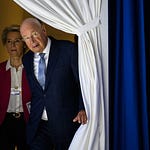Since World War II, Germans have defined their national identity around their commitment to liberal democracy. After the fall of the Third Reich, the architects of the new republic wrote a constitution, known as the “Basic Law,” designed to prevent a return to tyranny. It protects free speech, free assembly, and freedom of the press. It limits the powers of elected leaders and requires an independent judiciary. And the system worked. Even during moments of crisis — reunification, terrorism, economic turmoil — Germany’s institutions, for the most part, held.

Today, Germany’s liberal democracy is in grave danger. The government is seriously considering banning the most popular political party in the country, the Alternative for Germany, or AfD. It came in second in national elections in February and now leads in the polls. It has surged by campaigning against mass migration, energy shortages, and the erosion of national sovereignty. Instead of trying to defeat the party through open debate and fair elections, Germany’s political establishment has turned to the courts, the intelligence services, and the language of national security.
Today, the government’s domestic spy agency has labeled the AfD a “confirmed extremist organization,” a designation that opens the door to round-the-clock surveillance, undercover infiltration, and a ban. “It’s clear to me that a ban has to come," said a member of the governing Social Democratic Party (SPD). All of this comes at a time when state prosecutors are using new speech laws to target AfD candidates and supporters, fining them, harassing them, and in some cases trying to disqualify them from running for office. Behind closed doors, parliament leaders have refused to grant the AfD basic accommodations, including access to meeting space. What began as democratic competition is turning into something else.













